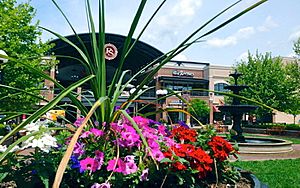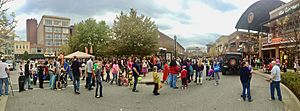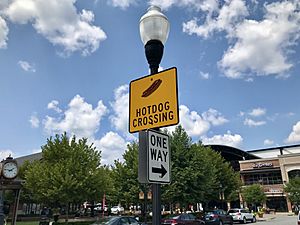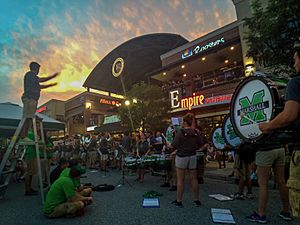Pullman Square facts for kids
 |
|
| Location | Huntington, West Virginia, United States |
|---|---|
| Address | 220 9th Street |
| Opening date | 2004 |
| Developer | Metropolitan Partners |
| Owner | Metropolitan Partners |
| No. of stores and services | 20+ |
| Total retail floor area | 200,000 square feet (19,000 m2) |
| No. of floors | 1 |
Pullman Square is a fun and modern shopping area in downtown Huntington, West Virginia. It's called a lifestyle center because it has shops, restaurants, and entertainment all in one place. You can find it between 8th and 10th Street and 3rd Avenue and Veteran's Memorial Boulevard. This lively spot opened in 2004 and was built by Metropolitan Partners. It's home to over 20 stores, places to eat, offices, and a movie theater.
Contents
The Story of Pullman Square
The Superblock Challenge
Before Pullman Square, this area was known as the "Superblock." It was a big, empty space in downtown Huntington. In 1970, four city blocks were torn down to make room for a new, large development. This empty area was about 9 acres (3.6 hectares) in size.
For many years, people tried to build exciting things on the Superblock, but it was a big challenge.
- In 1977, the Huntington Civic Arena was built on one part of the land.
- After that, many plans for hotels, stores, and even a huge complex called RiverCenter were suggested.
- These plans often failed because they couldn't get enough money or find big businesses to join.
- One idea was an outlet mall in 1987, but it quickly fell apart. People even said the Superblock had a "13-year history of failure."
A few businesses did open on the Superblock over time. A Chi-Chi's Mexican restaurant opened in 1991. Later, a Holiday Inn hotel was built next to the Civic Arena in 1998.
Planning a New Future
In 1998, a new idea came up: building an "intermodal facility." This was a fancy name for a place that would combine a bus station for the Tri-State Transit Authority (TTA), new shops, and parking garages. Money for this project came from the U.S. Congress and local governments.
The plan was to build this facility on two blocks of empty parking lots. Studies suggested it should have lots of retail space and hundreds of parking spots. People also thought it should include entertainment, dining, and even cultural spots. The goal was to start building in early 2000.
One problem was the Chi-Chi's restaurant. It was in the way of the new development. Chi-Chi's didn't want to move, even though they were offered a chance to have a new restaurant in the proposed building.
Building Pullman Square
In 1999, it was announced that a developer from Columbus, Ohio, called Steiner + Associates (later Metropolitan Partners), would take on the Superblock project. They were known for creating lively downtown areas.
On October 18, 2000, they announced a big plan for a $60 million retail and entertainment complex. It would be about 200,000 square feet (18,580 square meters) and look like an "old-time small town." The project would include:
- Shops
- Restaurants
- A movie theater with 12 to 16 screens
- Two parking garages
The developers had built similar successful places like Newport on the Levee in Kentucky and Easton Town Center in Ohio. They hoped Pullman Square would open in the fall of 2002.
A big challenge was getting the Chi-Chi's restaurant to move. The city had to go to court in 2002 to get the property. Chi-Chi's eventually moved out, and their building was torn down in April 2003.
There were also some legal issues about how the project was getting money from the state. These issues went all the way to the Supreme Court of Appeals of West Virginia. Luckily, in October 2003, the court decided that the state could go ahead with funding Pullman Square and other projects.
Construction and Grand Opening
Construction on Pullman Square officially began on July 16, 2004. Workers started digging out the parking lots to build the new parking garages.
Pullman Square opened its doors on November 19, 2004, with the Marquee Cinemas movie theater. Other stores like Empire Books & News, EB Games, and Starbucks opened shortly after in December. More restaurants and shops, such as Funny Bone Comedy Club, Cold Stone Creamery, Uno Chicago Grill, and Max & Erma's, opened in 2005.
Over the years, some businesses have come and gone. For example, the Uno Chicago Grill had some problems and closed, but later reopened under new owners. Moe's Southwest Grill also moved to a nearby location.
In 2008, Community Trust Bank opened a branch at Pullman Square. In October 2018, Max and Erma’s closed its doors. In March 2019, a new business called Quicksilver Arcade and Bar was announced to take its place.
Pullman Square has become a popular spot for people in Huntington. It often hosts events, like the annual West Virginia Hot Dog Festival and pep rallies for Marshall University. It truly brought new life to the old Superblock!
Images for kids
 | Emma Amos |
 | Edward Mitchell Bannister |
 | Larry D. Alexander |
 | Ernie Barnes |





